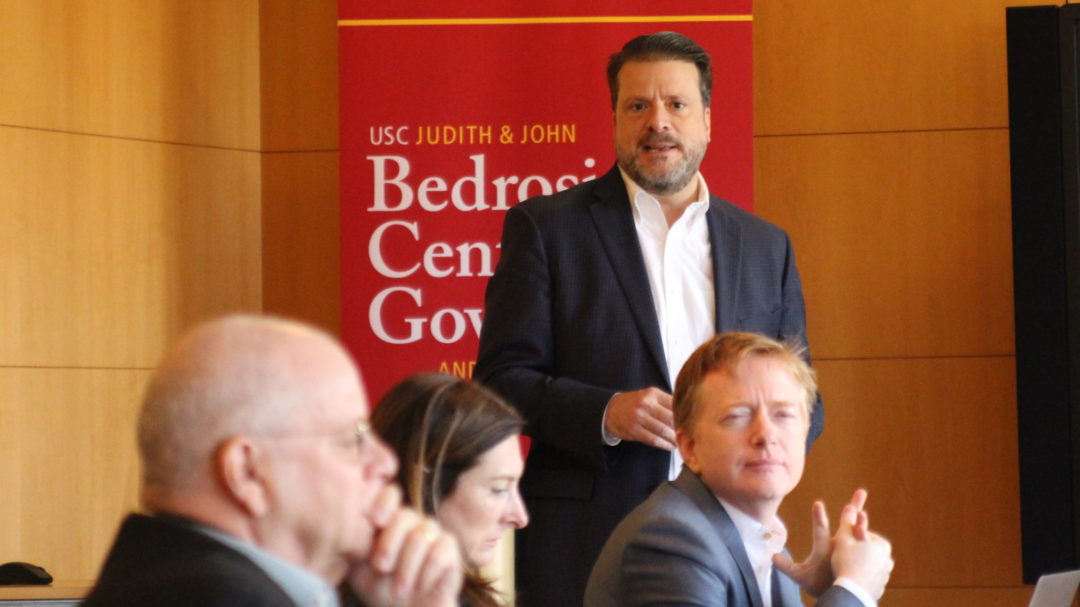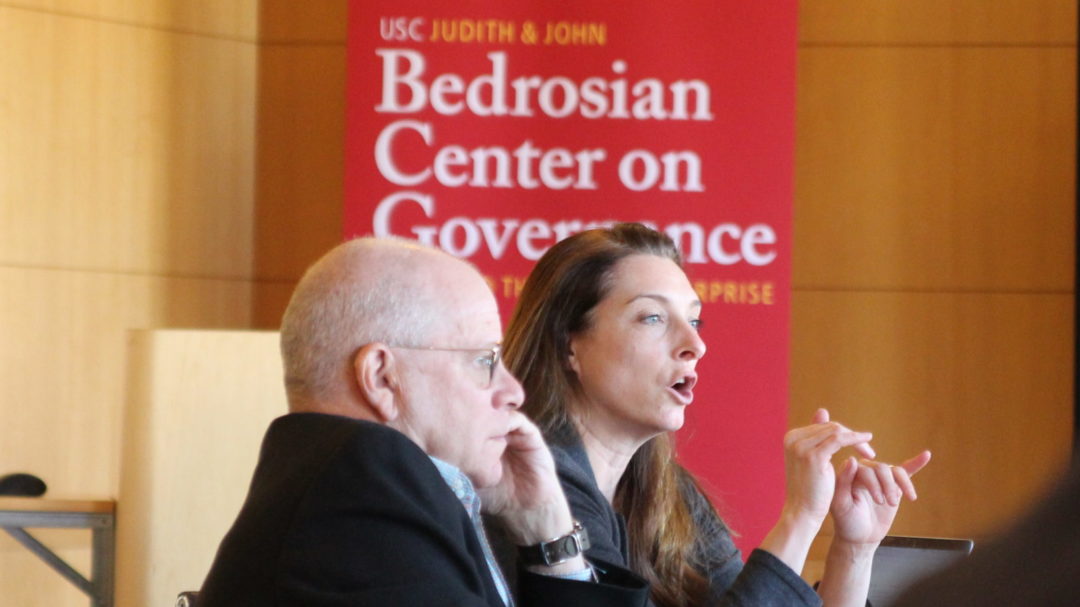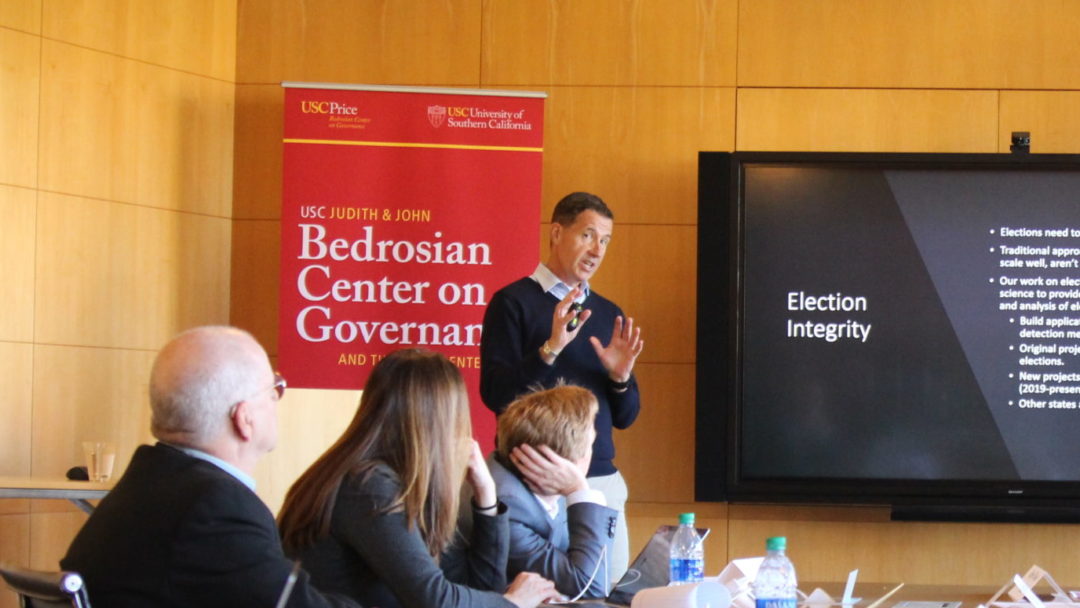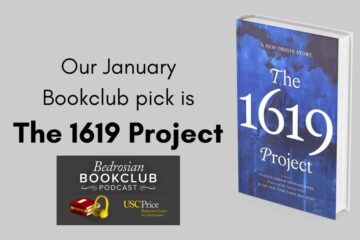Timely election administration and technology symposium draws leading scholars
by Nathan Micatka & Nicholas G. Napolio

Bedrosian Center Director, Jeffery A. Jenkins, sets the stage for the day. Photo by Aubrey Hicks, more photos on Flickr
On January 28th, 2020, the USC Bedrosian Center held a symposium on Election Administration and Technology, hosted by Jeffery A. Jenkins. The symposium brought together a group of leading scholars and experts to address election issues such as the use of voting technology, bureaucratic discretion, and voters and their congressional districts. As the 2020 election nears, administrative responses to election security, legitimacy, and citizen participation are critical.
Presenting new research at the symposium were Charles Stewart (MIT), D. Sunshine Hillygus (Duke), Robert Stein (Rice), Edward B. Foley (OSU-Law), Ryan Williamson (Auburn), and Christian Grose (USC). R. Mike Alvarez (Caltech) brought the symposium to a close with a talk on his forthcoming book about securing American elections.
The first panel featured Christian Grose (USC) and D. Sunshine Hillygus (Duke, presenting research on how political processes like the design and implementation of the US Census and the structure of electoral systems shape political representation. During the panel, the presenters explored the implications of primary election systems and the US Census on representation. Hillygus challenged social scientists to increase their attention to how the US Census process shapes political and electoral outcomes. Grose showed that top-two primary systems moderate the ideology of candidates that win elections to the US House of Representatives.

Robert Stein (Rice) and D. Sunshine Hillygus (Duke) discuss aspects of election administration during a break at the Election Administration and Technology symposium. Photo by Aubrey Hicks, more photos on Flickr.
Robert Stein (Rice) and Charles Stewart (MIT) looked at voting reforms and voter attitudes toward elections in the second panel. Using survey data from over 3,000 U.S. counties over five election cycles, Stein found that convenience voting (such as universal mail balloting) increases voter turnout levels. Relatedly, Stewart explored voter attitudes toward ballot counting technology. According to Stewart’s research, voters prefer the system they currently use over other methods. He argued that people who display computer anxiety similarly feel apprehensive toward computer-based election technology.
Stein’s and Stewart’s work informs state and local election administrators and state policymakers about the impact their election policy changes can have on electoral outcomes and voter attitudes.
The final panel concerned the legitimacy and integrity of elections—a timely topic given the controversy surrounding Russian interference in the 2016 election. Edward B. Foley (Ohio State) and Ryan Williamson (Auburn) addressed legitimacy and integrity via different means.
Foley’s paper sought to classify interference in elections as either serious threats to election legitimacy (e.g., disenfranchisement, hacking of voting machines, ballot stuffing) or second-order problems that do not fundamentally threaten election legitimacy (e.g., misinformation, persuasion and the like). Foley’s paper engendered a spirited debate among participants about what it means for an election to be legitimate, what threats to legitimacy ought to be dealt with legally, and whether the right to free speech implies allowing disinformation, no matter how insidious. Williamson focused on how prepared different election administration offices are for potential threats to election integrity. Williamson found that “a strong institutional foundation [is predictive] of enhanced capacity to address election security issues and degraded environments more broadly.”

R. Mike Alravez (Caltech) presenting research from his forthcoming bookSecuring American Elections. Photo by Aubrey Hicks, more photos on Flickr
To conclude the day, R. Mike Alvarez (Caltech) presented part of a book project, Securing American Elections. Alvarez partnered with election administrators to conduct daily audits of voter rolls, identifying anomalies using statistical techniques, and alerting administrators for them to investigate further. Alvarez found that all major anomalies in voter files were due not to hacking, fraud, or other malfeasance, but rather human error with no real repercussions for the integrity of the election.
Going into the 2020 election, popular fear of interference, fraud, or election meddling, means that leveraging the tools of rigorous social science is as important as ever.
Participants in the USC Bedrosian Center’s Symposium on Election Administration and Technology skillfully brought data, theory, and logic to bear on questions often driven by reflexive fear, anger, or confusion. As a result, voters and others affected by American politics can enter 2020 with real information and knowledge about the state of election administration and technology in the United States. Papers will be revised and edited for publication in the June issue of the Journal of Political Institutions and Political Economy.
Nathan Micatka is a PhD Student in Political Science and International Relations at USC
Nicholas G. Napolio is a PhD Student in Political Science at USC



